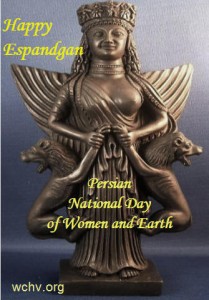Espandgan is an Ancient Iranian Celebration to Honor Women & Mother Earth & The Oldest of Its Kind. A day to celebrate Love & Mother Earth devoted to women & mothers in ancient Iranian culture. spandgan is attributed to SPENTA ARMAITI or Spandarmad in the Middle Iranian language of Sassanid era (Pahlavi, 224-654 CE). The SPENTA ARMAITI in Persian Mythology was the divinity of devotion and unconditional love. She was also the guardian of earth and farmers. In ancient Iran each day of the month had a name, and all months had 30 days, for example: 1st day: Ahuramazda or the God 2nd day: Bahman (good thoughts) 3rd day: Ardibehesht (truth/purity) 4th day: Shahrivar (heavonly Kingship This brings us to the fifth day “Sepandarmaz” . whenever the name of a day coincided with that of the month, a feast was held. So the feast of Espandgan is held on the Sepandarmaz day of the month of Espand. Similar feasts include: Mehrgan: The day of Mehr in the month of Mehr Abangan: The day of Aban in the month of Aban appreciating water) Azargan: The day of Azar in the month of Azar (appreciation of fire) In Ancient Persia women were partner with men and active in all walks of life. As per rules of Zoroastrianism women could reach the highest religious position such as Zoot that required extensive religious education. In Achaemenid era women held outstanding positions that even today can be extraordinary in the modern world. Out of six Ameshaspandan of Zarathustras religion divinities), three are masculine (Bahman, Ardibehesht, Shahrivar) and three are feminine (Espandarmaz, Khordad, Amordad). According to the book “The Eastern Iranian Civilizations “by “Giger” the great German thinker, a sign of equality of men and women position in Zoroastrianism is that after marriage a woman was assumed as a wife and partner of a man not his property or his subordinate. Chapter 19 book Hezar Dastan” (paragraph 3 &4) says: Girls cannot be forced to a marriage without their consent.” Christian Bartolomé, based on the book of “Hezar Dastan”, writes: in a Sasanian family after the fathers deat the wifes, girls and the sons had equal shares of inheritance. According to Avestan rules: 1 – women were able to handle their wealth by themselves. 2 – Woman could be the guardian of their children. 3 – Woman could legally represent their husbands and make decisions on their own during their husbands illness / unavailability. 4 – Women were able to prosecute their husbands for their unjust action. 5 – Men were not allowed to marry their daughters without the wifes knowledge or consent. 6 – Woman could witness at the court. 7 – Women were able to be a judge or a lawyer. 8 – Women were able to be subject to a will or arrange their own will. Sassanid era as “Darmesteter quoted was outstanding. Based on the documents of this period including Karnamak of Ardashir Papakan women were highly respected and held high positions and administered their wealth. The most striking symbol of equal rights of men and women in ancient Persia, was the possibility to transfer the crown and ruling power to women. Shapur II’s mother ruled the country for nearly twenty years before he reached the legal age for becoming the king. In Azarbad Mehrspand he saysto his son: ..whether your child is a girl or a boy, send him or her to school to adorn him / her with the light of wisdom and knowledge ..». ________________ قوانین اوستا : ۱- زن می توانسته دارایی خود را بتنهایی اداره کند. ۲- زن می توانسته سرپرست و نگهدار فرزندان خود باشد. ۳- زن می توانسته نماینده قانونی شوهر خود بوده و دربیماری شوهر امور را بتنهایی اداره کند ۴- زن می توانسته از شوهر ستمگر خود به دادستان شکایت کند و سزای او را بخواهد. ۵- شوهر حق نداشته است بدون اجازه ی زنش دختر خود را شوهر دهد. ۶- در دادگاه گواهی زن پذیرفته می شد. ۷- زن می توانسته است داور یا وکیل شود. ۸- زن می توانسته وصی قرار گیرد و تمام اموال خود را وصیت کند.

















